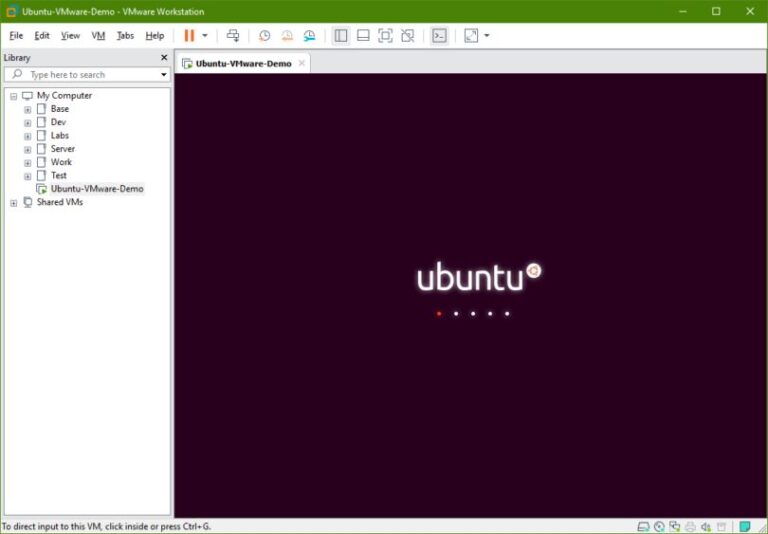
- #Ubuntu vmware player for free
- #Ubuntu vmware player install
- #Ubuntu vmware player update
- #Ubuntu vmware player windows 10
#Ubuntu vmware player windows 10
To increase the performance of the Windows 10 virtual PC, open the Processors hardware settings and tick all the features in the Virtualization Engine section and close the window.Īfter selecting the CD/DVD device from the Hardware section, select the Use ISO Image option and then click Browse to specify the location of the image file. To further configure the hardware settings of your Windows 10 guest system, click Edit Virtual Machine Settings from the Workstation interface.
#Ubuntu vmware player install
After checking the hardware information of your virtual system for the last time, click Finish and close the wizard.Īfter installing your guest system, close the warning window informing you that the first thing you need to do is to install the VMware Tools software and continue. You can see the hardware information of the Windows 10 virtual computer you have configured in the summary window. Leave the virtual disk location at default and continue. You can also see that the Virtual Network Editor and VMware Player software are installed after the installation.ĭetermine the virtual disk capacity of the guest machine depending on the actions you will take and choose to backup the virtual disk as a single file type. VMware-Workstation-Full-17.0.0-20800274.x86_64.bundle CopyĪfter the installation process is completed, find the VMware Workstation program from the Show Applications section and run it. sudo apt install build-essential dkms CopyĪfter downloading the VMware virtual machine software to the Downloads location, execute the commands below in the terminal to edit the executable permissions of the file and start the installation. To fix the GNU C Compiler error and install the dependent packages required to run the virtual machine program, execute the “sudo apt install build-essential” command in the terminal, and then press Y and Enter to confirm the installation of the dependent packages. Otherwise, you will get the GNU C Compiler error and will not be able to start the program. Now, you need to download and install the necessary Linux kernel packages on your system for the VMware program to run smoothly.
#Ubuntu vmware player update
After downloading the bundle extension setup file, execute the “sudo apt update” and “sudo apt upgrade” commands in the terminal to update the package list of the applications and components installed on your system. Please do not report bugs against vmware-player, or add bug tasks for vmware-player on current bug reports. While the package page for vmware-player in Launchpad does exist, no packages exist. VMWare Player is currently not available via the Ubuntu repositories. You can improve performance by using the VMware/Tools on your guest OS. You can do so with this command: chmod +x VMware-Player-14.0.0-6661328.x86_64.bundle

*If nothing appears, you may need to make the file executable. Open a terminal then run the package using gksudo: gksudo bash VMware-Player-14.0.0-6661328.x86_64.bundle Install build-essential: sudo apt install gcc build-essential -y A wide variety of appliances (both certified and other-wise) are available from VMware's Appliance Marketplace. An appliance can be created using certain VMware products, or you can download ready-made appliances. Virtual machines configured with an operating system and applications ready to perform a specific function are called virtual appliances.
#Ubuntu vmware player for free
It can be downloaded for free from VMware.

The host operating system runs the VMware Workstation Player, which provides the guest with resources like network access. To the guest operating system (the one running inside the virtual machine), it appears as though it were running on its own PC.

VMware Workstation Player (formerly VMware Player) allows you to run entire operating systems in a virtual machine, which runs on top of Ubuntu or Windows.


 0 kommentar(er)
0 kommentar(er)
